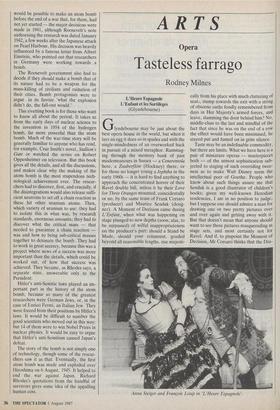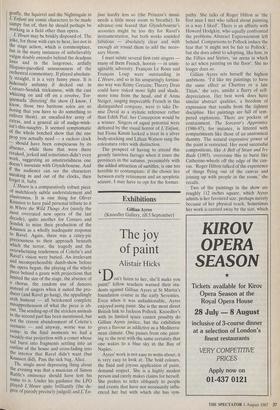ARTS
Opera
Tasteless farrago
Rodney Milnes
L'Heure Espagnole L'Enfant et les Sortileges (G lyndebourne)
G lyndebourne may be just about the best opera house in the world, but when it lays an egg it does so in spades and with the single-mindedness of an overworked hack in pursuit of a mixed metaphor. Rummag- ing through the memory bank of past misdemeanours in Sussex — a Cenerentola here, a Zauberfliite (Hockney) there, or for those no longer young a Jephtha in the early 1960s — it is hard to find anything to approach the concentrated horror of their Ravel double bill, unless it be their Love for Three Oranges mounted, coincidentally or no, by the same team of Frank Corsaro (producer) and Maurice Sendak (desig- ner). A Moment of Decision came during L'Enfant, when what was happening on stage plunged to new depths (soon, alas, to be surpassed) of wilful inappropriateness on the producer's part: should a Stand be Made, should your columnist, goaded beyond all reasonable lengths, rise majesti- cally from his place with much clattering of seats, stump towards the exit with a string of obscene oaths fondly remembered from days in Her Majesty's armed forces, and leave, slamming the door behind him? No, middle-class to the last and mindful of the fact that since he was on the end of a row the effect would have been minimised, he stayed put and fumed on in grim silence.
Taste may be an indefinable commodity, but there are limits. What we have here is a pair of miniature operas — masterpieces both — of the utmost sophistication sub- jected to staging of such overriding twee- ness as to make Walt Disney seem the intellectual peer of Goethe. People who know about such things assure me that Sendak is a good illustrator of children's books; given my well-known Herodian tendencies, I am in no position to judge, but I suppose one should admire a man for drawing one or two pretty pictures over and over again and getting away with it. But that doesn't mean that anyone should want to see these pictures masquerading as stage sets, and most certainly not for Ravel. And if, to pinpoint the Moment of Decision, Mr Corsaro thinks that the Dra- Anna Steiger and Francois Loup in L'Heure Espagnole'. gonfly, the Squirrel and the Nightingale in L'Enfant are comic characters to be made campy fun of, then he should perhaps be working in a field other than opera.
L'Heure may be briskly disposed of. The joke, for those with ears to hear, lies not in the stage action, which is commonplace, but in the many instances of unbelievably vulgar double entendre behind the deadpan lines and in the langorous, artfully Hispano-parodied sensuousness of the orchestral commentary. If played absolute- ly straight, it is a very funny piece. It is hideously unfunny if decked out in Corsaro-Sendak tricksiness, with the cast whizzing on and off on a revolve, Tor- quemada 'directing' the show (I know, I know, those two baritone solos are so boring that you have to do something to enliven them), an uncalled-for army of extras, and a general air of nudge-wink- isn't-this-naughty. It seemed symptomatic of the whole botched show that the one prop you actually need — a cuckoo clock — should have been conspicuous by its absence, while those that were there creaked, jerked and sometimes didn't even work, suggesting an amateurishness one doesn't associate with Glyndebourne. And if the audience can see the characters sneaking in and out of the clocks, then forget it, baby.
L'Heure is a comparatively robust piece of matchlessly subtle understatement and elusiveness. It is one thing for Oliver Knussen to have paid personal tribute to it in Where the Wild Things Are (surely the most overrated new opera of the last decade), quite another for Corsaro and Sendak to mine their production of the Knussen as a wholly inadequate response to Ravel. Again, there was a cutey-pie preciousness to their approach beneath which the terror, the tragedy and the overwhelming tenderness of Colette's and Ravel's vision were buried. An irrelevant and incomprehensible dumb-show before the opera began, the playing of the whole piece behind a gauze with projections that limited the size of the stage, the absence of a chorus, the random use of dancers Instead of singers when it suited the pro- ducer (and Ravel go hang), the appallingly arch humour — all betokened complete Misapprehension of what the piece is ab- out. The sending-up of the stricken animals in the second part has been mentioned, but not the craven abandonment of Colette's scenario — and anyway, worse was to come: in the final moments we had a twinkly-star projection with a comet whose tail burst into fragments settling into an outline of the house and cross-fading into the interior that Ravel didn't want (but Knussen did). Pass the sick bag, Alice. Thk. single most depressing thing about the evening was that a musician of Simon
Rattle's eminence should have lent his name to it. Under his guidance the LPO Played L'Heure quite brilliantly (the de- gree of parody precisely judged) and L'En-
fant hardly less so (the Princess's music needs a little more room to breathe). In advance one feared that Glyndebourne's acoustics might be too dry for Ravel's instrumentation, but both works sounded fabulous — absolutely clear and with enough air round them to add the neces- sary bloom.
I must salute several first-rate singers many of them French, hooray — in unim- aginable adversity. Francois Le Roux and Francois Loup were outstanding in L'Heure, and so in his unsparingly fortissi- mo way was Remy Corazza; Thierry Dran could have risked more light and shade, more tone from the head, and if Anna Steiger, singing impeccable French in this distinguished company, were to take De- nise Duval as a stylistic reference rather than Edith Piaf, her Concepcion would be a winner. Singers of equal potential were defeated by the visual horror of L'Enfant, but Fiona Kimm looked a treat in a silver body-stocking and Lillian Watson sang the coloratura roles with distinction.
The prospect of having to attend this grossly tasteless farrago when it tours the provinces in the autumn, presumably with the added attraction of surtitles, is one too horrible to contemplate: if the choice lies between early retirement and an apopletic seizure, I may have to opt for the former.



















































 Previous page
Previous page